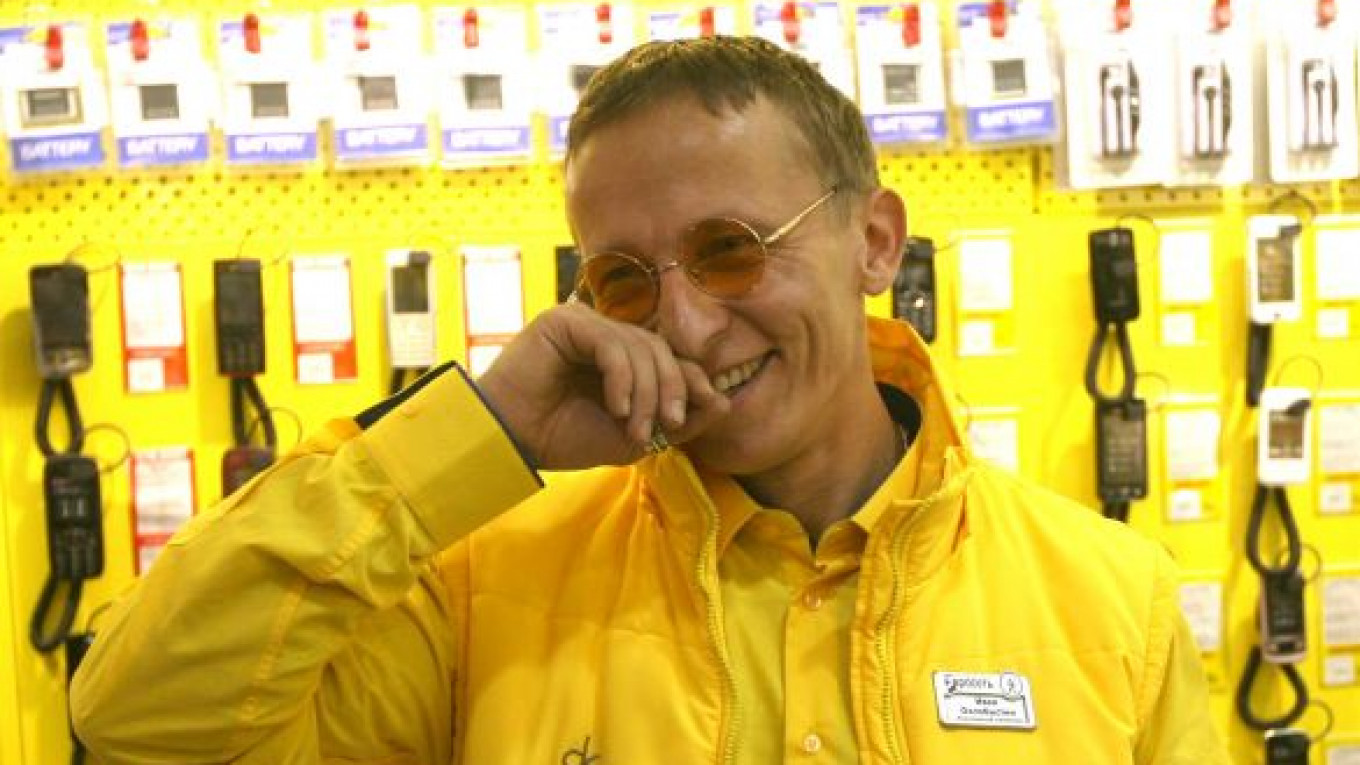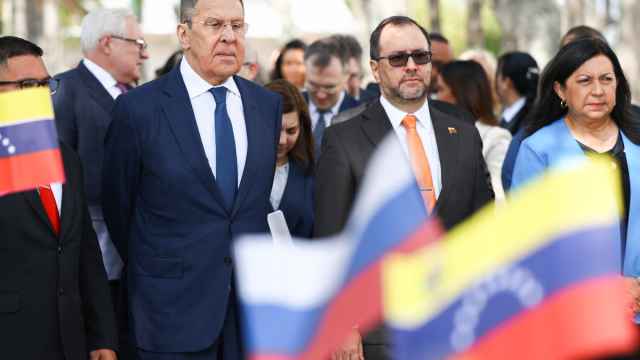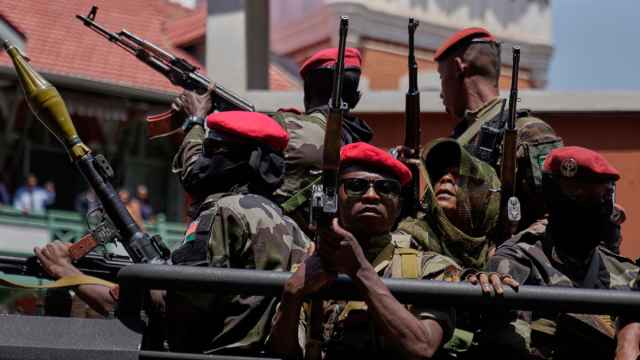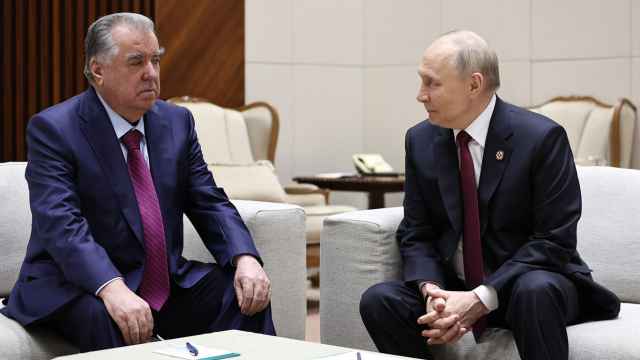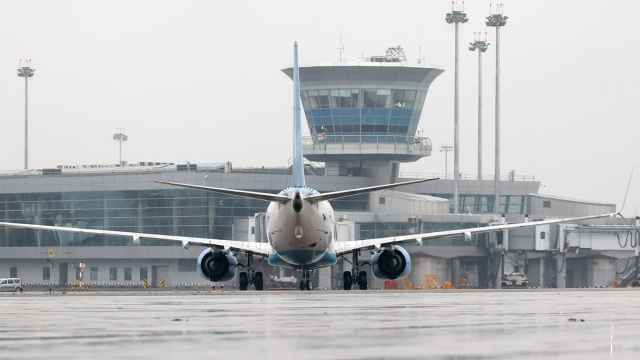Russian nationalism has many faces. Most are familiar stock characters, either populists on a Kremlin leash or caveman Hitler aficionados. But how about a hipster in John Lennon-style color glasses who is also an Orthodox priest and a sitcom star?
Meet Ivan Okhlobystin, 45, known to the general populace as Dr. Andrei Bykov, an ironic Russian counterpart to Gregory House, M.D., cracking salty jokes to patients in TNT's hit show "The Interns."
Off-screen he advocates a doctrine of "aristocratic national-patriotism." Just last month he spoke to an enthusiastic audience of 20,000 at Moscow's Luzhniki stadium. Last week, he requested that Patriarch Kirill allow him to join the Russian March, the notorious annual ultranationalist rally set for Friday.
"I have legitimized the term 'national-patriotism,'" the pony-tailed Okhlobystin said with pride in a recent interview with The Moscow Times.
"It was the weekend, and everyone was at their dachas," he continued softly, offering a tongue-in-cheek explanation of how he got away with the massive, politically charged event in central Moscow, where such happenings are very much frowned upon.
He sported jeans and a battered leather jacket during an interview at a Moscow cafe last month. It is a far cry from the priest's frock he was entitled to wear until recently and may yet don again, once he winds up his acting career.
Okhlobystin made a name for himself as an actor in the 1990s and early 2000s, when he starred in a dozen-plus films, peaking with the main role in cult classic "Down House" (2001), a surrealist take on Dostoevsky's "The Idiot."
But he took a sharp career turn at the end of that decade, announcing in 2001 that he was ordained into priesthood by an Orthodox Christian bishop in Uzbekistan's capital, Tashkent.
He served as a priest for several years in Moscow, but his restless nature got the better of him, and he returned to the movie set, first as a screenwriter — a short story of his was behind the grim action film "Paragraph 78" (2007) — and then as an actor.
Some of his roles resonated well with his newfound faith — he starred, for example, in Pavel Lungin's "Tsar" (2009), a spiritual study of a despot's soul. But even there, he played a fool, while in the made-for-TV "Conspiracy" (2007), he depicted Grigory Rasputin.
Okhlobystin also embraced mass culture again, starring in "The Interns," appearing at musical awards shows — usually in his trademark orange glasses — and even taking up the job of a creative director at mobile phone retailer Yevroset.
Church hierarchs eventually demanded that he choose between the laity and the clergy, and Patriarch Kirill suspended him from priesthood. But he still has the option of returning to being an active priest, and indicated he intends to do so — just not right now.
"I'll remain devoted to the church even if it declares me an anathema, because this institution played a formative role in my life. Because of it, I have a strong family," said Okhlobystin, a father of six.
During his speech in Luzhniki, Okhlobystin declared the late Metropolitan Ioann Ladozhsky, a nationalist-leaning Orthodox Christian bishop, as his "teacher." Ladozhsky, known for his anti-Semitic views, became an icon for the nationalist movement after his death in 1995.
Doctrine 77
In the meantime, Okhlobystin took on the role of a secular preacher. In September, he gave a lengthy speech on nationalism, addressing a crowd at Luzhniki from atop a huge white pyramid in a flashy scripted show.
Russia is "the only force that protects West and East from colliding," the white-robed Okhlobystin announced during the show, which bore the cryptic title "Doctrine 77."
"We have to collect the nation again, the one that owns everything here. We will create the new national society, a big family — an empire, in the end," he read out. "This is the only chance for the Russian man to exist."
His two-hour speech was too cryptic, however, to be defined as a clear political agenda and hard to place in the spectrum of typical nationalist rhetoric. His main point was that Russia's God-given task was to save the world from being taken over by any one nation, including Russia itself — a sort of divinely appointed international counterweight.
While seemingly aimed at the United States and complete with a denouncement of liberal values, his diatribe also came tempered with tolerance. Okhlobystin professed his love of all people, including Jews and those from the North Caucasus, while proclaiming that Russia was born "to fight wars."
This caused some head-scratching among the crowd, as most every other proponent of militant Russian nationalism has some enemy in mind — be it Americans, Europeans, Chechens or Jews.
Still, Okhlobystin voiced calls about the "destruction of society" paving the road to a newer, better Russia. He told the Times that his organization, the Aristocratic National Patriotic Movement, is biding its time for a revolution.
"We are the only party that retains a taste for revolutionary activity. Sooner or later it will happen," said the actor, flashing the emblem of the unregistered group — a metal pin of an eagle holding the number "77" in its talons.
At Luzhniki, the actor spoke out against family planning and gay marriages and says his group advocates monarchy and the "revival of the glory of the Russian empire," and the right to bear firearms. But he said the movement, which he plans to get registered by December, does not have a full-fledged program yet.
Okhlobystin confessed he drew inspiration from the banned National-Bolshevik Party, a radical anti-Kremlin vehicle of prominent writer-turned-politician Eduard Limonov, which combined hard leftist slogans with a nationalist slant.
"From some point, they are alien to me. But they're the only one to really pull off some action that resonated with people's feelings, like in Sevastopol," he said, referring to Limonov's group's short-lived 1999 takeover of a naval club in a Ukrainian city in Crimea, which Russian nationalists insist belongs to Russia.
Okhlobystin tread more carefully in a one-on-one chat than when facing a crowd, telling the Times that his calls for destruction were "just an attention grabber."
"Our task is not to allow that. We have to create a new society from the ground up, but we follow the Criminal Code," he said, quoting a famous Soviet-era satirical novel, "The Little Golden Calf."
He added that a model member of his movement would be Prince Myshkin, the kind-hearted and guileless hero of Dostoevsky's "The Idiot." "You have to be a bit mad to join, because if authorities would rule us dangerous, you'd be persecuted," he said.
PR Pirate
Independent political analyst Stanislav Belkovsky, who knows Okhlobystin well, said he would not likely follow the militant and self-destructive path of the National-Bolsheviks.
Okhlobystin is a showman, not a destroyer, Belkovsky said by phone.
"He wouldn't agree with me, but I think he went to priesthood because there were no roles for him to play in the 1990s," he said.
The show in Luzhniki was indeed impressive, and the event enjoyed exquisite PR stagecraft, as the actor announced ahead of it that he would run for president.
He changed his mind soon after the rally, citing the church's disapproval, but by then, his statement had been made. "Doctrine 77" was not televised, but videos of it garnered more than 500,000 views on YouTube.
Critics have even slammed him for making money on patriotism, after it turned out that cell phone operator Beeline introduced a tariff called "Doctrine 77" some weeks before the event.
Company spokeswoman Anna Aibasheva confirmed that a niche tariff with that name is on offer in Yevroset shops, but denied that Beeline was behind the Luzhniki event.
The actor denied cashing in on the Luzhniki show, which he said he booked with his own money. He says his political activism has not harmed his relationship with TNT, which focuses on entertainment. A spokesperson for the channel agreed, saying by phone that the channel is not concerned with how Okhlobystin spends his free time.
That did not stop the actor from attacking television bosses in general. "You have no way of knowing how corrupt these people's minds are," he said.
"But they don't have any leverage to stop me. The box office overrides … their fear," he added.
Church officials have not reacted negatively to his involvement in "The Interns," Okhlobystin said.
"They are a very educated audience that understands I am a very sincere person, as far as my political views are concerned," and regardless of his day job, he said.
Okhlobystin has not fully come to grips with his past, however, judging by a recent appearance on Vladimir Pozner's show on Channel One. When a viewer reminded Okhlobystin of his "shameful" past love of absinthe, he bristled, insisting that the matter "was not intended for a public discussion."
Still, Okhlobystin called himself in the interview "an experienced PR strategist." Indeed, he dabbled in political consultancy in 1990s, and even ran for the State Duma in 1999 with Kedr, a tiny green party that he freely admitted was just a spoiler for the Communists, then a real political force.
"It was strictly business, and I've never denied it. I was sailing on the last ship of 'black PR.' We all were Jack Sparrows at that time," Okhlobystin said, referring to the pirate captain from Walt Disney's "Pirates of the Caribbean" movie series.
But he stood by his words at Luzhniki, insisting the "Doctrine 77" show was the real deal, regardless of the promotion surrounding it.
"I have raised questions that have been discussed for a long time before in basements and gyms," he said, naming two popular kinds of hangouts for nationalists.
Russia for Whom?
Okhlobystin's potential audience is sweeping. According to an August by Levada Center, 45 percent of the Russian populace believed that people from other countries treated them with hostility, and 46 percent admitted feeling such hostility toward other nations themselves.
The slogan "Russia for Russians" is catching up with the public, but nobody knows quite what it entails. Radical nationalists hardly ever go beyond proposals to expel Caucasus natives and other non-Russians, even while entertaining dreams of a new Russian empire.
Loyal nationalists, such as Vladimir Zhirinovsky, head of the Liberal Democrats, or Dmitry Rogozin, Russia's envoy to NATO, are even less focused, sticking to vaguely hawkish bashing of the West.
Much of the uncertainty comes from the fact that Russian nationalism is largely an outlet for social discontent, with disenchanted small-town youth with few career prospects — a downside of the country's bureaucratized, oil-dependent economy — looking for an enemy to vent their frustration on.
Nevertheless, the situation is believed to worry the Kremlin, which has employed a dual strategy of denying independent nationalists their own legal political organizations while creating government-linked movements to contain the nationalist vote.
No stable pro-Kremlin nationalist group, however, exists at the moment, and Okhlobystin's show — which could not have been staged without tacit government approval — prompted talks that it was a new project by Vladislav Surkov, the Kremlin's political mastermind.
Okhlobystin denied ties to Surkov but said his speech might be welcomed by the ruling authorities.
"This is why, I think, I'm still a free man," he joked.
Indeed, political activists who fall on the wrong side of the Kremlin are regularly banned and hit with criminal charges, though very few are jailed.
Apparently encouraged, Okhlobystin made his bid to join the Russian March, asking Patriarch Kirill to sanction his participation and promising to lead out 500,000 to the streets. Kirill has yet to comment on the issue.
That plan had even more pronounced political undercurrents because the Russian March that Okhlobystin was invited to competes with an event organized by well-known Kremlin opponents, including radical nationalists Dmitry Dyomushkin and Alexander Belov, as well as whistleblower Alexei Navalny.
Organizers of the "alternative" rally said they envisage Okhlobystin as a counterbalance to Navalny. Neither man — whose popularity with the middle class stands at comparable levels — has commented on the attempt to pit them against each other. Navalny was not available for comment Wednesday.
Analyst Belkovsky agreed that Okhlobystin's activity is not a Kremlin stunt.
"He is not played by anyone. He is himself a player," Belkovsky said.
He added that authorities have largely ignored Okhlobystin's attempt at public discussion about the rise of nationalist sentiment in the country, but said they should.
"They think that nothing would change from what he said. I believe it's a mistake," he said.
While the Kremlin has never commented on Okhlobystin's political antics, the church has been more vocal. Vsevolod Chaplin, spokesman for the Moscow Patriarchate, said in September that he feels "sympathetic" toward some of the issues Okhlobystin raised.
"He's raised some questions that have been silenced, and he's done it right. There's an issue with [rights of] Russians in the country," he said on an NTV talk show.
But Okhlobystin said his point was to make sure that the nationalist question was being addressed.
"My task was to create a public climate for a discussion of these issues," he said. "If an issue is not taken up openly, sooner or later it would swell up like an abscess, and disaster would ensue."
A Message from The Moscow Times:
Dear readers,
We are facing unprecedented challenges. Russia's Prosecutor General's Office has designated The Moscow Times as an "undesirable" organization, criminalizing our work and putting our staff at risk of prosecution. This follows our earlier unjust labeling as a "foreign agent."
These actions are direct attempts to silence independent journalism in Russia. The authorities claim our work "discredits the decisions of the Russian leadership." We see things differently: we strive to provide accurate, unbiased reporting on Russia.
We, the journalists of The Moscow Times, refuse to be silenced. But to continue our work, we need your help.
Your support, no matter how small, makes a world of difference. If you can, please support us monthly starting from just $2. It's quick to set up, and every contribution makes a significant impact.
By supporting The Moscow Times, you're defending open, independent journalism in the face of repression. Thank you for standing with us.
Remind me later.


